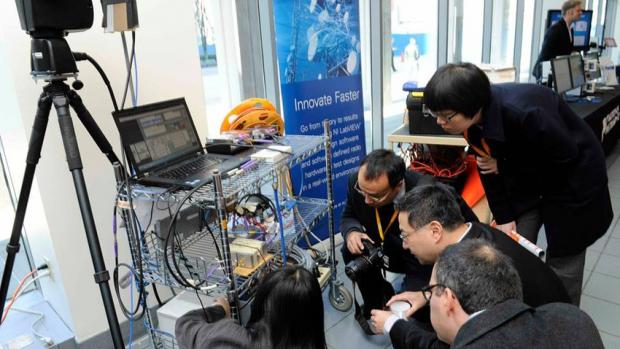Brooklyn 5G Summit to Fuel the Next Generation of Lightning-Fast Mobile Communications
Global Industry Leaders and Academics to Explore, Showcase Newest Technology and Research

Leaders in wireless, automotive, healthcare, academia and government will gather at the third annual Brooklyn 5G Summit April 20-22, 2016 to explore and showcase the latest developments and research aimed at making 5G a commercial reality in telecommunications, machine-to-machine communication, and the Internet of Things (IoT).
The invitation-only summit, at New York University’s Tandon School of Engineering, is jointly organized by NYU WIRELESS and Nokia, and will be live streamed by the IEEE Communications Society. The event features leaders from companies including Nokia, Verizon, DoCoMo, Intel, Qualcomm, T-Mobile, and Vodafone, as well as the Federal Communications Commission and the Scripps Clinic and Research Institute.
“This is a watershed moment for 5G wireless,” said Theodore (Ted) S. Rappaport, the Ernst Weber/David Lee professor of electrical engineering at NYU Tandon and founder and director of NYU WIRELESS. “We are in the midst of a dramatic increase not only in the sheer number of mobile smart devices, wearables, and machine-to-machine connections, but also in sheer volume of the data traffic these and other IoT devices are generating. With multi-gigabit-per-second mobile communications nearing reality, this is an exciting time for the wireless industry, and we are pleased to play a major role as a convener and producer of basic knowledge to bring wireless into its Renaissance over the next several years.”
“The 5G era architecture will be the fabric that opens up a whole new set of human possibilities. Technology innovations have made it possible to do 5G earlier than most thought, with operators moving to pre-standard implementation to start developing and trialing 5G business models before the commercial availability of the full 5G standard,” said Volker Ziegler, head of 5G leadership and chief architect for Nokia. “Early 5G services will be rolled out in 2017, with full 5G commercial services coming in 2020 that will transform and automate how we live in the digital world.”NYU WIRELESS conducted the world’s first radio channel measurements that proved that the millimeter-wave (mmWave) spectrum holds vast potential to improve wireless communications – to perhaps 1,000 times the capacity and many times the speed of 4G LTE. The need is acute. A new report by Bell Labs Consulting, a division of Nokia Bell Labs research, estimates that by 2020 global consumption demand for digital content and services on mobile and portable devices will increase an average of 30 to 45 times from 2014 levels — with some markets experiencing as much as a 98-fold jump. Audio and video streaming traffic will account for 79 percent of the traffic increase.
Summit Highlights
Technical challenges to creating efficient 5G networks and innovations in cell networks and mmWave technology will be key topics at the Brooklyn 5G Summit. Also, for the first time, the summit includes an automotive focus featuring a keynote and panel participation by researchers at Toyota’s InfoTechnology Center.
Presentations by industry leaders will include Tom Keathley, executive vice president of AT&T; Marcus Weldon, president of Nokia Bell Labs and Nokia CTO; Onur Altintas, Toyota InfoTechnology Center fellow; and Seizo Onoe, chief technology officer of Japanese carrier NTT DoCoMo.
Many of the 17 industry affiliate sponsors of NYU WIRELESS are testing breakthrough 5G systems and platforms. Several will demonstrate prototypes and explain their advances. And, for the first time at Brooklyn 5G, Dutch semiconductor company NXP will bring a massive, three-level truck filled with 140 IoT products and technology from companies including Jawbone, Garmin, Disney, Adidas, and Microsoft.
NYU WIRELESS will demonstrate:
- Its pioneering channel sounding system and measurements for indoor and outdoor environments that dispelled the myth that human bodies would block mmWaves; this demonstration will cover the 73 gigahertz spectrum.
- The mmWave channel simulator software that NYU WIRELESS is making open-source in order to speed 5G development.
- An innovative biosensor system for neuroscience applications that takes precise measurements of electrochemical signals. The technology is being developed by NYU WIRELESS and Center for Neural Sciences at NYU.
Ranked the number-one academic research center for 5G wireless by FierceWirelessTech, NYU WIRELESS has been a key contributor to the Federal Communications Commission’s drive to create a standards framework for mmWave communications.
To watch the live stream on April 21 and 22, register at https://register.comsoc.org/bklyn5g. Join the conversation: #BKLYN5G, #5G, #Nokia, and @NYUWireless. For more information, visit http://brooklyn5gsummit.com.
Note: Images available at http://dam.poly.edu/?c=1713&k=8f254ec611
About NYU WIRELESS
NYU WIRELESS is a multi-disciplinary academic research center that offers an unprecedented and unique set of skills. Centered at New York University’s Brooklyn engineering location and involving more than 200 faculty and students throughout the entire NYU community, NYU WIRELESS offers its faculty, students, and affiliated sponsors from industry a world-class research environment that is creating the fundamental theories and techniques for next-generation mass-deployable wireless devices across a wide range of applications and markets. This center combines NYU’s Tandon School of Engineering program, School of Medicine and Courant Institute of Mathematical Sciences, and offers a depth of expertise with unparalleled capabilities for the creation of new wireless circuits and systems as well as new health care solutions for the wireless industry. For more information, visit wireless.engineering.nyu.edu.
About the New York University Tandon School of Engineering
The NYU Tandon School of Engineering dates to 1854, when the NYU School of Civil Engineering and Architecture as well as the Brooklyn Collegiate and Polytechnic Institute (widely known as Brooklyn Poly) were founded. Their successor institutions merged in January 2014 to create a comprehensive school of education and research in engineering and applied sciences, rooted in a tradition of invention, innovation and entrepreneurship. In addition to programs at its main campus in downtown Brooklyn, it is closely connected to engineering programs in NYU Abu Dhabi and NYU Shanghai, and it operates business incubators in downtown Manhattan and Brooklyn. For more information, visit engineering.nyu.edu




